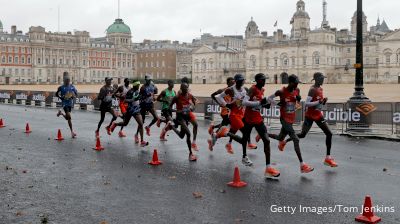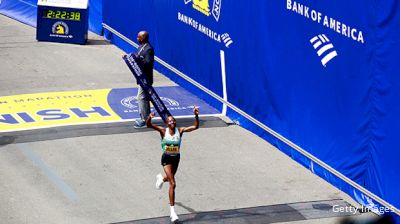New Coach Needed To Revive Ryan Hall's Magic
New Coach Needed To Revive Ryan Hall's Magic
New Coach Needed To Revive Ryan Hall's Magic

Ryan Hall used to run with such grace and freedom.
I recently rediscovered video of his American record half marathon and reminded myself of why the Big Bear, Calif. native is considered one of the massive talents of American distance running. He ran so smoothly, easily pulling away from the field and continuing to hammer through the lonely miles in the ladder stages of the race. We saw similar examples of brilliance in his dominant win at the 2008 Olympic Trials and from his 2:04:58 run in 2011 at the Boston Marathon.
Watch more video of 2007 Chevron Houston Marathon on flotrack.org
Hall exhibited a magical quality that we hadn't seen from an American marathoner in decades. After dropping out from the Olympic marathon and announcing his withdrawal from the New York City Marathon, that magic has disappeared.
Where did the magic go? I'm not sure, but a series of injuries have derailed Hall's career from the path it was on.
In a recent interview with Dick Patrick of Runner's World, Hall said he is taking a break from running until his injuries heal and, more importantly, is considering taking on a coach. Hall has relied on faith-based coaching since leaving the Mammoth Track Club late in 2010, a move that seemed to work for a period of time.
What Hall needs is consistent, objective analysis of his daily training. Distance runners are notorious overworkers who would run themselves off a cliff's edge in training if not for a coach to hold them back. Chris Solinsky overdoing things the year after a breakthrough season in 2010 is a perfect example.
Hall appears to be taking the opposite approach. As a response to what he felt like was overtraining during his days in Mammoth, Hall now takes a day off every week. He's also gone away from his successful past at altitude, doing a considerable amount of training at sea level in Redding, Calif.
Perhaps ramping down mileage and taking a break from altitude may have necessary changes, but when an athlete is the sole judge of their training, it's nearly impossible for them to be objective about their work. A coach might have given him advice about dealing with his plantar fascia injury or kept his critical pre-marathon training stints at altitude rather than sea level. Moving forward, working full-time with a Joe Vigil or Jack Daniels could get Hall back on the right track and hopefully allow him to realize his potential.
Related Content
 PR Of The Week presented by TrackSmith: Gracie Hyde
PR Of The Week presented by TrackSmith: Gracie HydeApr 17, 2024
 How to Watch: 2024 MPA Outdoor Championships | Class A | Track and Field
How to Watch: 2024 MPA Outdoor Championships | Class A | Track and FieldApr 17, 2024
 Molly Seidel on the other side of injury and looking ahead to fall marathon
Molly Seidel on the other side of injury and looking ahead to fall marathonApr 17, 2024
 London Marathon 2024 Schedule: What To Know
London Marathon 2024 Schedule: What To KnowApr 16, 2024
 Dakotah Lindwurm looking at head to Paris 2024
Dakotah Lindwurm looking at head to Paris 2024Apr 16, 2024
 'It Was Worth It.' High-Fivin' Emma Bates Soaked In The Boston Experience
'It Was Worth It.' High-Fivin' Emma Bates Soaked In The Boston ExperienceApr 16, 2024
 Desiree Linden, Tough As Ever, Finishes 16th At Boston Marathon
Desiree Linden, Tough As Ever, Finishes 16th At Boston MarathonApr 15, 2024
 A Dominant Finish From Obiri, A Slick Execution From Lemma In Boston
A Dominant Finish From Obiri, A Slick Execution From Lemma In BostonApr 15, 2024
 Parker Valby, Colin Sahlman And Gracie Hyde Re-Write History At Bryan Clay
Parker Valby, Colin Sahlman And Gracie Hyde Re-Write History At Bryan ClayApr 15, 2024